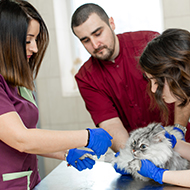Campaign underway to ensure owners understand the dangers of using permethrin products on cats
International Cat Care is undertaking a campaign following recent reported incidents of cat-death after use of permethrin-containing dog flea products. This is the most common cause of cat poisoning in many countries, simply because permethrin-containing products are widely and easily available.
The campaign is demanding that dog spot-on flea products containing permethrin should not be issued without a verbal warning at the point of sale. Although packaging states that it is not safe for use on cats, this is either being overlooked or not taken seriously.
When a customer buys a permethrin-containing product it should also be checked whether there are cats in the home where it will be used. It should be warned that after treatment, dogs and cats must be kept separate for 72 hours.
There are other non-permethrin-containing products sold in pet shops under the NFA-VPS authorisation, and many of these have a much safer profile if used accidentally on cats.
Dr Andy Sparkes, Veterinary Director of International Cat Care commented “Many practices see permethrin poisoning in cats several times a year but do not contact the Veterinary Medicines Directorate (VMD) because the product is not a Prescription Only Medication (POM), or they feel that the Directorate is already aware of the problem. We feel strongly that the problem is greatly under-reported. Nothing will be done unless the full extent of the problem is realised by the VMD, so please report each one by going to http://www/vmd.defra.gov.uk/adversereactionreporting/".






 Birmingham Dogs Home has issued an urgent winter appeal as it faces more challenges over the Christmas period.
Birmingham Dogs Home has issued an urgent winter appeal as it faces more challenges over the Christmas period.
